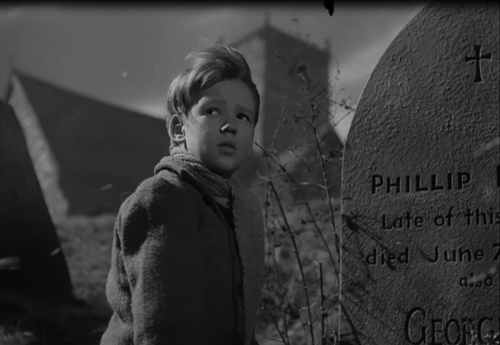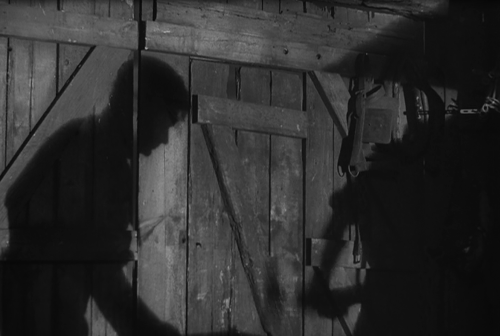David Lean’s Great Expectations (1946): Casting and the Bildungsroman
by Mark Wallace
Yesterday, I discussed Brian McFarlane on Great Expectations and its numerous adaptations. McFarlane gives most space to David Lean’s Great Expectations (1946), widely acknowledged as the best screening of the novel, if not the best of all Dickens adaptations. McFarlane saves this one for last:
I have deliberately left it until the end of this book to see whether any of the other versions, on screens large or small, might offer a serious challenge to its pre-eminence. They don’t. ( Charles Dickens’ Great Expectations: The Relationship Between Text and Film [2008], 127)
McFarlane’s enthusiasm for Lean’s film prompted me to rewatch it. My own feeling about the film is the same as it was after the first time I watched it: I love the first 38 minutes, and can do without the remaining 75. There is a very simple reason for this. As McFarlane notes early in the book, Great Expectations is a bildungsroman: a novel that traces “the development of the protagonist’s mind and character, as he passes from childhood through varied experiences – and usually through a spiritual crisis – into maturity and the recognition of his identity and role in the world” (M.H. Abrams, quoted in McFarlane, 3). There is a serious difficulty in filming a bildungsroman in that the protagonist passes from childhood to maturity, and it is generally physically unfeasible for the same actor to play the protagonist at all stages of the film. Generally, there will be two: in this case, “Young Pip” and “[Older] Pip”
Young Pip is Anthony Wager, aged 13/14 at the time, a totally untrained and inexperienced actor, who gives a compelling and naturalistic performance.

Anthony Wager as Young Pip in the opening scene of the film
Older Pip is John Mills, a well-established actor who had started his training at a dancing school in the 1920s. He was aged 38 at the time of shooting.
The transition from Young Pip to Pip that takes place on 38 minutes is an extremely awkward one. The film allows six years to pass unrepresented as Pip follows his apprenticeship. This lacunae of six years is not present in the novel, and its function is obvious: to prepare the audience for a physically changed Pip. We fade out on Pip and Estella walking down the stairs of Satis House, the dialogue between them two and Mrs Havisham having established that they will not see each other again, and that Pip is about to embark on an apprenticeship, and we fade in on the blacksmith’s forge, with John Mill’s voiceover announcing:
It was in the sixth year of my apprenticeship, and it was a Friday night.

The shot, with Pip in silhouette, that announces the passage of six years from the preceding scene.
Yet nothing can adequately prepare us for the Pip we see before us: in reality, Mills was 24 (!) years older than Wager, rather than 6, and he looks it. We are immediately jarred out of the suspension of disbelief the film has created. Age aside, their physical appearances and demeanours are nothing alike, and their acting styles, too, are diametrically opposed. Wager was naturalistic; Mills is mannered, obviously a schooled actor. Wager’s Pip was hesitant and timid; Mills is smiling and open-faced.

John Mills’ first appearance as Pip in the film
This single piece of careless casting mars the film – irretrievably, for me. Any sense of the character is lost. Probably Mills as a well-known actor was the most important presence to Lean. So perhaps a different young Pip would have worked, though I hesitate to say it, for I think that Wager is excellent and that Mills’ performance has not dated well.
We all probably know examples of this: it is a staple of the bildungsroman, as I have said, that at least two actors are often called upon, but I think this is the single most damaging example of it I have seen. (The Estella transition is also pretty jarring – perhaps this was a blind spot of Lean’s.) Much as there is to admire about this film, I prefer Lean’s Oliver Twist (1948): an easier book to film, if only because it is not a bildungsroman and we only know the protagonist as a child. Any thoughts? Am I exaggerating the importance of this element? Are there other bildungsroman films which suffer from a similar casting problem?
[…] Tomorrow, I will post on the David Lean film Great Expectations (1946), McFarlane’s favorite version, but one which I find to be flawed for a simple reason that McFarlane doesn’t go into in his book. (here) […]
The film Gainsbourg has a rather jarring transition between the two actors. Though Erik A. does a good job with a problematic script, I still like the first part of the film better. Though that may also be the script: Any musical biopic has to decide how many musical “genesis” stories it will contain. Amadeus wisely limits itself, but Gainsbourg does not. It tries to explain how too many songs came to be. That stuff, by necessity, is in the second half, which limits it. And also the “Geule”/ugly mug personified is mostly later, and that is problematic too.
In Lean, I didn’t mind the change as much as you did.